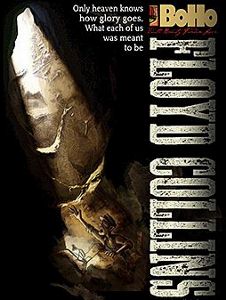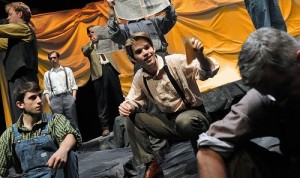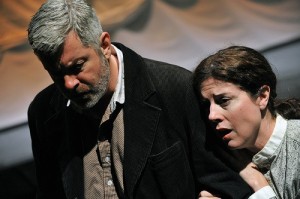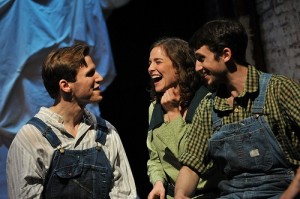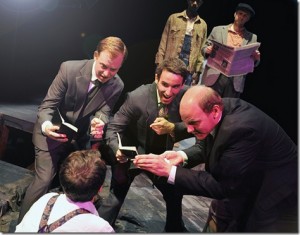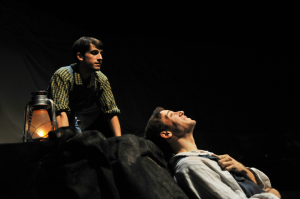THE YODELING ROCKS, THE SHOW DOES NOT
Before Adam Guettel was declared the next Sondheim by many for his beautiful, swelling Light in the Piazza score, he drew on the rich folk sounds of Kentucky for the tale of Floyd Collins. This lesser-known musical is the true-life story about a passionate Kentucky spelunker whose foot gets stuck inside a newly discovered cave; the attempts to save him were exploited for national publicity, and – with the advent of radio – the story became America’s first incident of on-sight reporting by mass-media, drawing tens of thousands of people to the site.
Bohemian Theatre Ensemble (BoHo) created a stir when they announced it as the capper of their 2011-2012 season – after all, this musical caused quite a buzz when it premiered at Playwright’s Horizon in 1996, yet it is rarely produced. Composer/lyricist Guettel, the grandson of Richard Rodgers and son of Mary Rodgers (Once Upon a Mattress), was hailed as a bright, sophisticated new voice in American Musical Theatre, one who stood poised to reinvent the genre as Sondheim did. Yet even as the original cast recording remains a cult favorite, the Off-Broadway production only lasted 25 performances. Despite all the bustle and excitement surrounding the revival at Theater Wit, BoHo never quite manages to get Floyd out of the cave – figuratively and literally, I suppose.
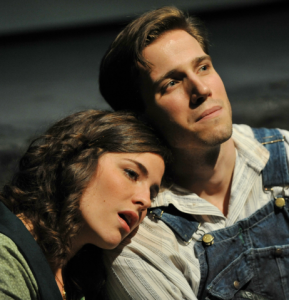 But it’s not entirely their fault. Tina Lindau’s book feels like a brash, cheapened Broadway retelling of an old Kentucky folk tale. Guettel’s beautiful score elegantly disguises her book – one which, despite its pretenses, doesn’t offer much depth. The running theme is that capitalism creates a culture where financial gain is viewed as glory, and yes, this fosters exploitation, but none of this is particularly groundbreaking; yet this is where Floyd Collins seems to think itself insightful. Furthermore, most of the characters in the show are woefully simplistic. Floyd goes into the cave because he loves caves and thinks he can make money, and prove his mean old papa wrong. Skeets Miller, a Louisville reporter, seems bad at first (because, apparently, all reporters are exploitative) until we find out that he secretly wants to be an operatic baritone – so he’s good at heart, because he’s not really a reporter? And Nellie Collins, Floyd’s adoring younger sister, isn’t driven by much other than her dreams and her love for her brothers. The show presents characters that are two-dimensional at best, even when portrayed by stronger cast members.
But it’s not entirely their fault. Tina Lindau’s book feels like a brash, cheapened Broadway retelling of an old Kentucky folk tale. Guettel’s beautiful score elegantly disguises her book – one which, despite its pretenses, doesn’t offer much depth. The running theme is that capitalism creates a culture where financial gain is viewed as glory, and yes, this fosters exploitation, but none of this is particularly groundbreaking; yet this is where Floyd Collins seems to think itself insightful. Furthermore, most of the characters in the show are woefully simplistic. Floyd goes into the cave because he loves caves and thinks he can make money, and prove his mean old papa wrong. Skeets Miller, a Louisville reporter, seems bad at first (because, apparently, all reporters are exploitative) until we find out that he secretly wants to be an operatic baritone – so he’s good at heart, because he’s not really a reporter? And Nellie Collins, Floyd’s adoring younger sister, isn’t driven by much other than her dreams and her love for her brothers. The show presents characters that are two-dimensional at best, even when portrayed by stronger cast members.
Less forgivable is that transitions into the songs are somewhat jarring, as if they were an afterthought – and given the strength of this score, they shouldn’t be. Even the passage of time is unclear throughout: In the first act, we get a sense that Floyd has been trapped in the cave for days. Then suddenly in the second act, there’s a musical montage that is interrupted by the announcement of days as they pass, calling into question any sense of the timeframe you think you have. BoHo’s cast does a commendable job trying to navigate this rocky ground, but they were set up to stumble by Landau’s problematic book.
Still, this Floyd Collins has mined some gems despite the fool’s gold in the libretto. The piece is magnificently sung throughout, with few exceptions. The cast blends perfectly with one another, allowing all of the subtle intricacies of Guettel’s score to glimmer without feeling too polished, really pushing on the folk influence. The solemn opening number (“The Ballad of Floyd Collins”) on its own was enough to bring chills, with a simple five-piece orchestra that is careful not to overpower the cast. This production of Floyd is worth seeing for the music on its own, which will echo in your head for days after. Credit is due to music director Alan Bukowiecki and the musicians: Allison Hendrix (conductor, keyboard), Nicholas Davio (percussion, synthesizer, harmonicas), Kim Lawson (violin), and Jim Konsbruck and Dave Saenger (guitar, banjo).
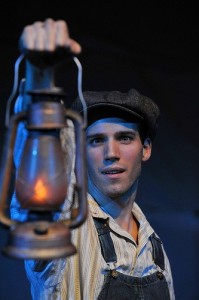 Though he is immobile for a majority of the show, Jim DeSelm is radiant as the title character. Even having been trapped in a cave for days on end, he maintains a rough-around-the-edges charm and charisma that really carries the show. Whatever else is happening on stage, watching this once brashly confident, handsome young man begin to lose hope instills some of the necessary urgency to this production, reminding us that the stakes are high.
Though he is immobile for a majority of the show, Jim DeSelm is radiant as the title character. Even having been trapped in a cave for days on end, he maintains a rough-around-the-edges charm and charisma that really carries the show. Whatever else is happening on stage, watching this once brashly confident, handsome young man begin to lose hope instills some of the necessary urgency to this production, reminding us that the stakes are high.
As Floyd’s loyal younger brother Homer, Jon Harrison is also a standout of this cast. His vocals soar, and he manages to make a highlight out of a poorly written role. One minute, Homer is dead-set on saving his brother, the next he is tempted into utilizing his brother’s story for a movie. Harrison makes this jump almost believable, which is quite a feat in itself. Both Harrison and DeSelm are rising stars, and certainly names worth following. Also deserving mention is Greg Foster, a very genuine Skeets Miller, the journalist who interviewed Collins in the cave, receiving a Pulitzer Prize for his coverage. Benjamin Kerkberger, Michael Postic, and Tom McGunn also excel as the reporters who perform perhaps the most entertaining number in the show, however out of place it is (“Is That Remarkable?”).
For this folky production, Sarah Bockel feels forced and melodramatic as Nelly, a centerpiece of this show. She is too much Broadway and not enough Kentucky. Her “Through the Mountain” is indeed strong and passionate, but seems incongruent to the proceedings; it felt like a number from Les Miserables, a show much better-suited to Bockel’s performance.
Other members of the ensemble are not quite as strong. As Lee Collins, Floyd’s stern father, Russell Alan Rowe is unforgivingly stiff, a sort of caricature of a southern authoritarian. Christa Buck also feels a little forced as Lee’s loving wife, Miss Jane. The two awkwardly fumble through their duet “Heart an’ Hand,” making it one of the slowest moments of the show. Buck’s performance is stronger in scenes where she is not opposite Rowe, but still leaves something to be desired. At times, minor members of the ensemble seem amateurish – some of the larger scenes are plagued with open palm gestures and distracting pantomiming intended to suggest activity.
The rest of the ensemble aren’t done many favors by Peter Marston Sullivan’s direction, which feels muddled and scattered; we lose much of the tension requisite to this musical across Diane Fairchild’s multileveled, barren, greyscale set. Sullivan creates some really nice moments with individual characters, especially Floyd’s two early numbers where he first explores the cave, but larger scenes feel accidentally strewn together, amongst which most of the story’s power gets lost. Characters come off as frantic, when they needed the sense of urgency that DeSelm captured so authentically with Floyd.
While issues remain about the libretto and some of the direction, this production of Floyd is probably as good as any you’ll see – in part because it both sounds amazing and contains strong performances, but also because it probably won’t be done again for a very long time. Even with Guettel’s magnificent score, BoHo’s production serves as a reminder that there’s a reason why this show stays underground.
photos by Peter Coombs
Floyd Collins
Bohemian Theatre Ensemble
Theater Wit
ends on July 15, 2012
for tickets, call 773-975-8150 or visit Theater Wit
for more shows, visit Theatre in Chicago
